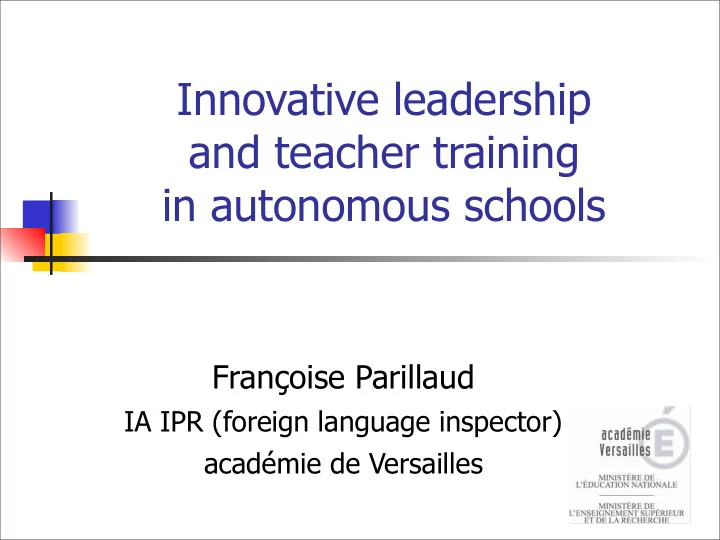

Innovative leadership and teacher training in autonomous schools Françoise Parillaud IA IPR (foreign language inspector) académie de Versailles
My work place : the académie de Versailles
Its main characteristics One of the 3 academies that correspond to the région Ile de France (Paris, Créteil and Versailles) Subdivided into 4 départements : les Yvelines (78), l’Essonne (91), les Hauts-de-Seine (92) et le Val- d’Oise (95). The first in numbers among the 30 French academies 1 100 000 primary and secondary school children (9% of the children and teenagers attending school in France) 100 000 staff members (teaching and administrative personnel, technicians, health care workers,…)
The challenges it faces Contrasted situations within a department or even within a more local unit. The highest percentage of schoolchildren from a privileged background (45% vs 34% for the whole country) A high percentage of schoolchildren from an underprivileged background (30%) Our goal : to improve our knowledge of such diversity in order to improve our way of dealing with it. Our ambition : to provide each school with more accurate and more efficient guidance and support.
Emphasis on teacher training The académie de Versailles welcomes a great number of trainee teachers. this year: 1 238 primary school trainee teachers 1 349 secondary schools trainee teachers and young teachers with little experience. 10% of the teaching staff is below 30 years old 1 out of 22 teachers in the académie has just completed his training
the role and missions of a regional pedagogical inspector contributing to managing the education system at a regional level and to overseeing the implementation of education policies and new reforms in classes and schools assessing and advising secondary school teachers contributing to the management of teaching staff as part of their career development supervising the set of continuing training programs for English teachers in the academy
Exerting more effective leadership through joint efforts we help connect various levels (national, regional, local), we do not manage schools, our expertise can combine with that of school managers, teacher training is our main lever for action
Initial teacher training A new provider : the Ecole Supérieure du Professorat et de l’Education (a strong partnership between universities and the académie (=the teachers’ employer) The model now adopted : the combined building of strong subject expertise and high professional skills .
Continuing training The provider : a division called DAFPA (Direction d’Appui à la Formation des Personnels de l’Académie) in charge of designing, engineering and implementing the training offered to the Versailles staff. Le Plan Académique de Formation and its training offerings : every year teachers can individually apply for and attend a whole range of training courses and workshops
Continuing training A flexible efficient option that is more and more privileged . A local scale : a sub territorial unit that is smaller than un department and gathers about 30 primary schools, 15 colleges and 5 or 6 lycées. Team training instead of individual training (disciplinary, pluri or interdisciplinary) Training workshops that meet local demands and answer specific needs (school leaders, teachers and inspectors analyse together the needs of the teachers within a school or a network of schools and get in touch with the local correspondent of the organization in charge of providing training – a local negotiating process) Collaborative work and peer training/coaching among teachers in schools (ICT, interdisciplinary projects to help the students attain the seven key competences of the common core of knowledge and skills, tailored support,…)
Joint role of the school heads and take advantage of the autonomy - limited as it may be – that schools have gained to organize schedules, plan a structure that fosters change, questions traditional approaches and meets local needs identify the human resources within the school and work in closer contact with a pool of teachers that are ready to show the way and that are likely to be followed by others. provide regular support, supervision and follow-up.
Collaborative platforms A multifaceted objective: strengthen schoolchildren’s skills by integrating a range of preferred learning styles develop a common virtual space that facilitates exchanges between teachers and students, among students and among teachers. professionalize teachers, encourage the sharing of knowledge and pedagogical techniques and the development and transfer of good practices. for school leaders and inspectors: it is an effective means and medium to stimulate both students and
Recommend
More recommend